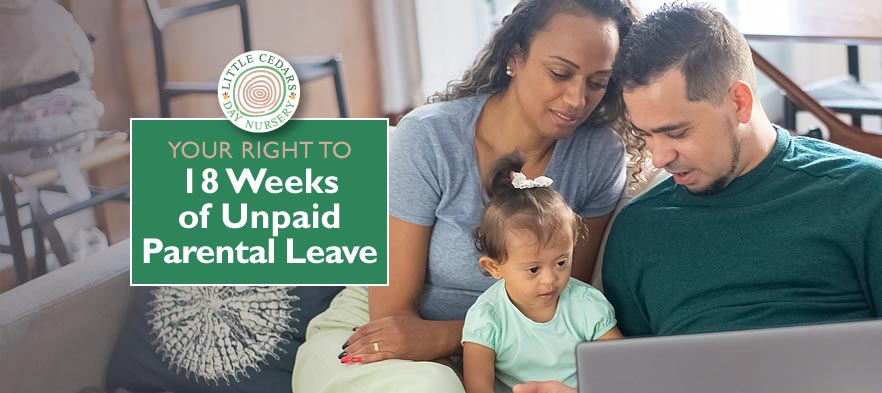
Our statutory maternity leave & pay guide from August 2021 briefly touched upon a parent’s right to unpaid parental leave. As promised, we now come back to the topic in more detail, below.
 Your Right to Unpaid Parental Leave
Your Right to Unpaid Parental Leave
It’s fair to say that many employed parents* in the UK are unaware of their right to take parental leave on an unpaid basis. In fact, employees are entitled to take up to 18 weeks of unpaid leave before their child reaches the age of 18. That’s significant time off in addition to any standard annual leave. It’s per child too.
*While we use the term “parents”, the rules apply to those with ‘parental responsibility’ over the child. This includes parents who are named on the child’s birth certificate or adoption certificate, or those who officially have, or expect to have, parental responsibility(i) over the child. Foster parents are not eligible unless they are legally recognised as having parental responsibility e.g. via a successful UK court application.
Why Take Unpaid Parental Leave?
Parenting is an incredibly important task. However, it’s not always easy for working parents to find enough family time with their children, even at important milestones in their children’s lives. Aside from holidays and breaks, sometimes parents simply need additional time off to gain necessary time with, or for, their children.  For example, there may come a time when parents need to look at nurseries, pre-schools, primary and secondary schools and, as children approach their mid teens, further education settings. Other reasons to take time off might include time for parents to visit relatives with the children, or to investigate extra-curricular activities such as sports clubs, or simply to spend quality time with their children.
For example, there may come a time when parents need to look at nurseries, pre-schools, primary and secondary schools and, as children approach their mid teens, further education settings. Other reasons to take time off might include time for parents to visit relatives with the children, or to investigate extra-curricular activities such as sports clubs, or simply to spend quality time with their children.
The good news is that most parents who are employees in the UK are entitled to additional time off, on an unpaid basis, from their employer. Although it’s unpaid leave, it can be an absolute Godsend to busy parents, who may well appreciate the time off even if they have to go without pay during their absence. Rules apply, of course, but it’s fair to say that many parents do not make the most of this opportunity.
How Much Unpaid Leave Are Parents Entitled To?
Parents can take 18 weeks of unpaid leave per child until the child reaches the age of 18. The maximum they can take in any one year is 4 weeks (again, per child) unless their employer agrees to more. Unpaid parental leave must be taken in whole weeks rather than sporadic days. Should an employee only work for, say, 4 days per week, then their week off is essentially the same as that. Should their working pattern be more random, then an average of how many days they work per week is computed from working times over the whole year.
What if Parents Change Jobs?
 It doesn’t really matter if you change jobs. The rules around unpaid parental leave apply in relation to your child(ren); not your employer. So, if you change jobs and have already used up 9 weeks of unpaid leave for one child during your previous job, then you can still use another 9 weeks, so long as it’s taken before your child reaches the age of 18.
It doesn’t really matter if you change jobs. The rules around unpaid parental leave apply in relation to your child(ren); not your employer. So, if you change jobs and have already used up 9 weeks of unpaid leave for one child during your previous job, then you can still use another 9 weeks, so long as it’s taken before your child reaches the age of 18.
What Other Rules Apply Around Eligibility?
In addition to the rules discussed above, an eligible parent must have been employed by their current employer for at least one year before making a claim. They must be an employee (not a contractor/sub-contractor, agency worker, ‘worker’ or self-employed).
Employers have a right to ask to see a birth certificate or other proof showing parental responsibility over the child in question. And, of course, the child for whom the claim is being made must be under 18.
Claiming Unpaid Parental Leave
 To claim a period of unpaid parental leave, just 21 days (3 weeks) of notice must be given to the employer and this must state the start and finish dates. It can be confirmed verbally although employers may request the notice in writing.
To claim a period of unpaid parental leave, just 21 days (3 weeks) of notice must be given to the employer and this must state the start and finish dates. It can be confirmed verbally although employers may request the notice in writing.
Given that 3 weeks’ notice is not long in the business world, an employer has the right to request a postponement of the unpaid parental leave if there is a fair reason for doing so. An example would be where such leave would cause significant disruption to the smooth running of the business — perhaps suitable cover cannot be arranged in time. However, in such a scenario, the employer must confirm in writing, within a week of the original request, why the leave is being denied. They must also suggest a new date for it to begin. This must be no later than 6 months after the original date and must be for the same number of weeks originally requested.
Make the Most of Your Parental Leave Allowance
So, all in all, it’s pretty straight forward to get extra leave off work to spend with, or for, your children. Although this particular type of leave is unpaid, sometimes time is the most precious commodity of all — often far more important than money. There’s also only one chance to make the most of your child’s childhood, so unpaid leave is worth thinking about from time to time, while you still have rights to it under UK employment law.
A Wonderful Childcare Nursery in Streatham, SW16
 We hope that the information brought to you here is useful. We are Little Cedars, a wonderful nursery in Streatham, supplying an outstanding childcare service in and around Streatham, Streatham Common, Streatham Hill, Streatham Park, Furzedown, Tooting, Tooting Bec, Norbury, Balham and Colliers Wood. Why not book a visit with your child to see the setting in action, register for a place, or contact us to ask any questions — we’ll be happy to help.
We hope that the information brought to you here is useful. We are Little Cedars, a wonderful nursery in Streatham, supplying an outstanding childcare service in and around Streatham, Streatham Common, Streatham Hill, Streatham Park, Furzedown, Tooting, Tooting Bec, Norbury, Balham and Colliers Wood. Why not book a visit with your child to see the setting in action, register for a place, or contact us to ask any questions — we’ll be happy to help.

